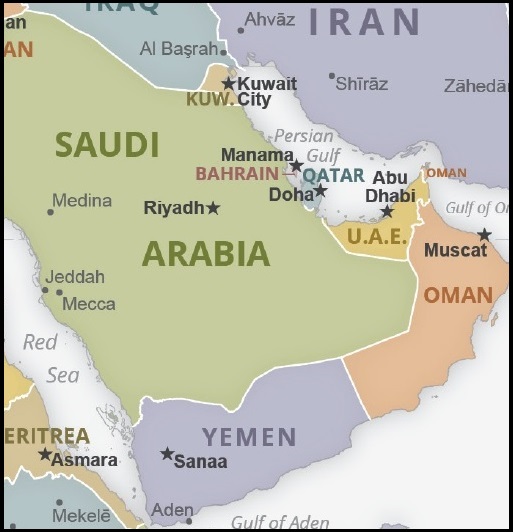U.S. and GCC Joint Stance on Iran
On February 16, the United States and the six countries of the Gulf Cooperation Council (GCC) condemned Iran for its disruptive behavior in the region and committed to expand defense cooperation to deter Tehran. Further “interoperability” is necessary to “constrain Iran’s ability to conduct destabilizing activities,” the United States and the GCC said in a joint statement following working group meetings in Riyadh, Saudi Arabia. Robert Malley, the U.S. special envoy for Iran, participated. The GCC, formed in 1981, includes Bahrain, Kuwait, Oman, Qatar, Saudi Arabia, and the United Arab Emirates.
 The countries expressed “grave concerns” over Iranian military ties to state and non-state actors, such as the Houthis in Yemen. They warned that Tehran’s proliferation of weapons—including drones, missiles, and conventional arms—posed a “grave security threat to the region and the entire world.” The statement called on the international community to enforce U.N. Security Council resolutions that restricted Iran’s arms transfers.
The countries expressed “grave concerns” over Iranian military ties to state and non-state actors, such as the Houthis in Yemen. They warned that Tehran’s proliferation of weapons—including drones, missiles, and conventional arms—posed a “grave security threat to the region and the entire world.” The statement called on the international community to enforce U.N. Security Council resolutions that restricted Iran’s arms transfers.
The U.S. and Gulf countries also blamed the Islamic Republic’s nuclear advances for “exacerbating regional and global tensions.” They demanded that Iran engage in “meaningful diplomacy” and cooperate with the U.N. nuclear watchdog on an investigation into undeclared traces of uranium. The joint statement was released on the final day of a four-day summit. The Biden administration sent Malley along with other senior officials to meet with the GCC on issues including air and missile defense, maritime security, counterterrorism, and Iran. The following is the full text of the U.S.-GCC joint statement on Iran.
Joint Statement
Senior officials of the United States (U.S.) and members of the Gulf Cooperation Council (GCC) convened a meeting of the Working Group on Iran at the GCC’s headquarters in Riyadh on February 15, 2023. The Working Group affirmed the longstanding partnership between the United States and the members of the GCC and our shared determination to contribute to regional security and stability under the framework of the GCC-U.S. Strategic Partnership.

The United States and GCC member states raised their grave concerns about the Iranian military’s deepening two-way cooperation with state and non-state actors, including Iran’s ongoing provision of conventional weapons, advanced missiles, and UAS systems to the Houthis that have prolonged the conflict in Yemen, worsening the humanitarian disaster there. The United States and GCC member states affirmed that Iran’s ongoing proliferation of weapons to state and non-state actors poses a grave security threat to the region and the entire world.
The United States and GCC member states further underlined that Iran’s nuclear advances as documented by the IAEA, chief among them the production of highly enriched uranium (HEU), have no credible civilian purpose and are gravely exacerbating regional and global tensions. They called on Iran to immediately reverse course, cease its nuclear provocations, engage in meaningful diplomacy, and fully cooperate with the International Atomic Energy Agency (IAEA) investigations into particles of nuclear material found at undeclared locations in Iran, consistent with Iran’s safeguards obligations. The United States reaffirmed President Biden’s commitment not to allow Iran to acquire a nuclear weapon.
The United States and GCC member states expressed their commitment to expanding defense cooperation and interoperability to enhance their capabilities to constrain Iran’s ability to conduct destabilizing activities and deter it from conducting future acts of aggression. They reiterated that, in their view, diplomacy remained the preferred way to address Iran’s destabilizing policies and nuclear escalation in a sustained manner, and they emphasized that Iran’s leadership could choose a better alternative that would contribute to a more secure and stable region and benefit the Iranian people.
They urged the international community to enforce all relevant United Nations Security Council Resolutions prohibiting transfers of arms and related materiel and ensuring accountability in this regard.






